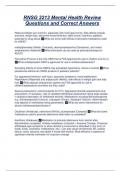RNSG 2213 Mental Health Review
Questions and Correct Answers
Rebound effects are common, especially with multi-dose forms. Side effects include
anorexia, weight loss, abnormal movements/tics, labile mood, insomnia, agitation,
potential for drug abuse ✅What are some side effects of stimulant medications used
for ADHD?
methylphenidate (Ritalin, Concerta), dextroamphetamine (Dexedrine), and mixed
amphetamine (Adderall) ✅What stimulants can be used as pharmacotherapy for
ADHD?
Fluoxetine (Prozac) is the only SSRI that is FDA approved for use in children over 8 y.o.
✅What antidepressant SSRI is approved for use in children/adolescents?
Activating effects of some SSRIs may precipitate hypomania, mania or suicide ✅What
paradoxical effects can SSRIs produce in pediatric patients?
For aggressive behavior, self-injury, psychotic symptoms, mood stabilization.
Risperidone (Risperdal) and aripiprazole (Abilify); side effects of weight gain and fatty
liver ✅What atypical antipsychotic agents are FDA approved for use in
children/adolescents and when are they used?
Seizure precautions; anticonvulsants for DT's. Aggression/Suicide assessments and
precautions, if necessary. Use of validated withdrawal assessment rating scale assists
in objective description of withdrawal severity. Medications including Benzodiazepines
e.g. chlordiazepoxide (Librium), oxazepam (Serax), diazepam (Valium). Administration
may depend on withdrawal rating parameters. ✅What are some interventions for
alcohol withdrawal/detoxification?
Disulfiram (Antabuse), naltrexone (ReVia), acamprosate (Campral) ✅What are some
medications used to promote abstinence after detox is completed?
disulfiram (Antabuse) ✅Medication to promote abstinence from alcohol after
detoxification completed. Inhibits metabolism of alcohol = Aversive Therapy. Produces
withdrawal-type symptoms or when alcohol is consumed or absorbed in any form (in
foods, fluids, cosmetics, medications, etc.). Can also cause arrhythmias, MI, cardiac
failure, coma, seizures, and death if mixed with alcohol. Most effective in patients w/
significant internal motivation for long-term change
, naltrexone (ReVia) ✅Medication to promote abstinence from alcohol after
detoxification completed. Opioid receptor antagonist-blocks the "high" and reduces
cravings.
acamprosate (Campral) ✅Medication to promote abstinence from alcohol after
detoxification completed. Thought to reestablish prealcoholism balance b/t neuronal
inhibition and excitation to help reduce cravings
Naloxone (Narcan) IV; opioid antagonist ✅What medication is indicated in tx of opioid
overdose?
Alleviate depressive symptoms, restore normal mood, prevent recurrence of
depression, and prevent a swing into mania for bipolar patients ✅What are the goals of
antidepressant medications?
Selective serotonin reuptake inhibitors (SSRIs) ✅selectively block reuptake of
serotonin. First-line agent for tx of depression. Side effects—significant sexual
dysfunction, GI symptoms, apathy, insomnia, anxiety. Slow onset (2-4 weeks), which
s/b considered if pt is suicidal; combination w/ MAOIs produces serotonin syndrome,
which is fatal. Low potential for OD
Serotonin syndrome ✅fatal side effect of mixing SSRIs w/ MAOIs or any other drugs
that boost intrasynaptic serotonin; hyperthermia, rigidity, cognitive impairments,
autonomic symptoms
Tricyclic antidepressants (TCAs) ✅nonselective inhibition of norepinephrine and
serotonin. Because of non-selectivity, cause many side effects. Used to be gold
treatment of depression. Lag period of 2-4 weeks before antidepressant effect occurs.
Effects—sedation (therapeutic effect), alleviation of lethargy, anxiety reduction, urinary
hesitancy. Long half-life usually allow once-daily dosing. Side effects—anticholinergic
(dry mouth, decreased sweating, constipation, bladder dysfunction); cardiac
(tachycardias, arrhythmias, delay in conduction); orthostatic hypotension; suicide due to
energizing effect. Serious interactions when given with MAOIs, sympathomimetics
(cardiac arrhythmias), Warfarin (increased bleeding), antipsychotics, anticholinergics,
CNS depressants.
Therapeutic levels to 300 ng/ml; toxic reactions begin at 450 ng/ml ✅What are the
therapeutic and toxic blood levels for TCAs?
Lag period of 2-4 weeks. Certain drugs must be avoided, including OTC meds. Abrupt
d/c can cause nausea, headache, malaise. Report eye pain immediately. Some side
effects lessen after adjusting to medication ✅What patient teaching should be included
when TCAs are prescribed?




